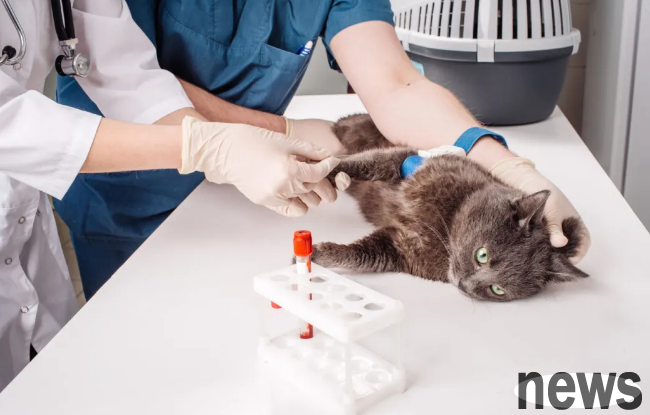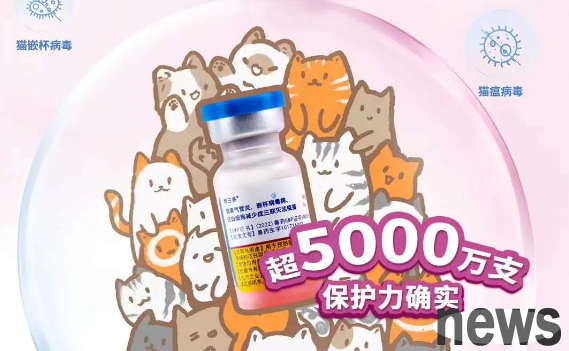Antibody detection is an important tool for evaluating cats’ immune status. Only after the cat's triple vaccine is properly vaccinated with, the cat's immune system will produce corresponding antibodies. By testing the levels of cats’ antibo...
Antibody detection is an important tool for evaluating cats’ immune status. Only after the cat's triple vaccine is properly vaccinated with, the cat's immune system will produce corresponding antibodies. By testing the levels of cats’ antibodies, we can better understand their immune status. What is

Antibody Testing
Serum antibody titer test is a method to measure the level of antibodies to certain pathogens (pathogenic organisms). Antibodies are Y-shaped proteins produced by B cells under the stimulation of antigens (toxins, foreign bodies or pathogens that trigger an immune response in the body, especially antibody production). By performing titer tests, you can understand the cat's immune status to determine whether it is necessary to get a vaccine. The role of
Antibody detection
Cat antibody detection has certain reference significance for evaluating vaccination effects, identifying individuals who have failed immunity, and determining immune needs. Helps protect the health of cats and provides them with better immune protection. Therefore, antibody testing can be recommended to pet owners after the cat is vaccinated to understand the pet's immune response to the vaccine.
·Evaluation of immune effect
Antibody tests can provide an accurate assessment of vaccination effect. By testing the antibody levels in cats, we can determine whether the vaccine successfully induces an immune response. This helps ensure that the cat is protected enough to be less vulnerable to disease.
·Identification of immune failures Individuals
Antibody detection can help identify immune failures. In rare cases, cats are vaccinated, but for various reasons, their immune system fails to produce enough antibody levels, resulting in immunity failure. Through antibody testing, we can detect these situations in a timely manner and take necessary measures such as re-vaccination or other forms of protection.
·Providing reference information
For the possible immune deficiency or disease history of certain cats, antibody testing can also provide important information. For example, for cats who have had immune-related diseases or have received immunosuppressive treatment, antibody testing can assess their immune status and provide guidance for vaccination. Application scenarios of
Antibody detection
·Assessment of
Post-immunization Antibody detection can evaluate the effectiveness of vaccination, supplement immunization in a timely manner or adjust the vaccination plan. After the kittens have completed their initial vaccination process (usually around 16 weeks of age), it is recommended to undergo titer tests after 4 weeks to ensure they have produced sufficient immunity.
·Antibody testing for cats with unknown immunization history is helpful in determining the immunity status of cats with incomplete or unknown vaccination records recently adopted. Test results can help pet doctors formulate corresponding vaccination plans.
·Outgoing, checking, pre-hospital examination
Before cats go out, fostering, checking or hospitalization, antibody testing can assess the cat's immune status and reduce the risk of infection. Common doubts about
antibody test results
·When will antibody test be tested?
It is usually recommended to wait 4 weeks before antibody testing after completing the first year of the complete vaccination procedure (using the inactivated vaccine). This is because the formation of antibodies takes a certain amount of time, and a few cats may have interference from maternal antibodies, so waiting for a period of time can ensure accurate assessment of the cat's antibody level.
·What is the specific significance of the results of antibody detection?
Parvovirus results are low, and a supplementary vaccine may be required to enhance antibodies. However, for herpes virus and calicivirus, the reference value of antibody test results is limited. When there is sufficient antibody to cat parvovirus, many pet doctors will experience lower antibodies to herpes virus and calicivirus and will not recommend supplemental vaccination. Instead, they will remind cat owners to increase their overall resistance. This is because the immunity of herpes virus and calicivirus does not work mainly through antibodies, so antibody detection does not represent an accurate reference significance for these two viruses.

·What should I do if the antibody test fails to meet the standards?
It is difficult to interpret items with a value of 0 in clinical practice, because it is different from zero titers and does not necessarily mean that cats are not protected. This result usually means that the titer fails to reach the threshold for providing protective immunity. However, if the antibody titer of cat parvovirus is 0, it means that the cat may not have a protective effect on cat parvovirus.
If cat parvovirus antibodies are almost non-existent and herpes and calicivirus antibodies are not detected, then the cat's immune system defects need to be considered (very rare).
If cat parvo antibodies are almost non-existent, but both herpes and calicivirus antibodies are present, it may be because cats are in poor health when vaccinated, such as respiratory problems or parasitic infections, which affects the effectiveness of the vaccine. In this case, the cat's overall health level should be first adjusted and protective measures should be taken strictly. After the cat fully recovers, it can be re-vaccinated and undergoes antibody testing after completing two shots of the vaccine.
·Is there any limitations in antibody detection?
Due to the presence of an immune threshold, the exact antibody levels required for complete protection may vary from cat to cat. Low test results do not necessarily mean that cats are prone to this disease.
AVMA (American Association of Feline Practitioners) mentioned that cats with positive tests for feline parvovirus antibodies (value ≥1) are immune to the virus. The test results of feline herpes virus and feline calicivirus "do not necessarily closely related to protective immunity and should not be used to predict future protective effects."
·Can antibody test replace vaccination?
No. Cats need to be vaccinated to establish initial immunity, and antibody test results are only used to whether to receive additional vaccines or booster shots.
·Can a qualified antibody still be infected with FPV, FCV and FHV?
A cat that has successfully established immunity will hardly be infected with cat parvovirus. For cat herpes and cat calicivirus, cats may still be infected and become infected, but getting vaccinated can significantly reduce the chance of illness and the risk of severe illness. For example, feline herpes virus may recur once it is infected (usually mild clinical symptoms appear and then heals itself). If a cat is under malnutrition, suffers from major diseases or is seriously contaminated with pathogens in the living environment, it will also affect its antibody level and increase the risk of disease.
·Why do I have to get a booster injection every year after undergoing antibody testing? The purpose of
antibody detection is to evaluate the immune status of cats to specific pathogens, especially the protection of cat parvoviruses. Given the high lethality of feline parvovirus, even if antibody tests show that cats have some protection against cat parvovirus, it is still crucial to receive an enhanced injection every year. Especially for cats who often go out, foster care, and multi-cat families, it is very important to get a booster injection every year. Because cats may be exposed to potential pathogens more frequently in high-risk environments, and annual booster needles ensure that their immune system maintains a high level of protection and promptly resist pathogen invasion.
For cat calicivirus and herpes virus, antibody testing does not have the same significance. Nevertheless, it is still recommended to get a booster injection every year just in case. This ensures that even if antibody testing does not provide complete protection, cats can still obtain adequate protection against potential pathogen threats.
Suggested immune process Refer to the figure
Zoten Miaosanduo®️Vaccine has an efficient protective effect, covering three common infectious diseases in cats (female parvovirus, herpes virus and calicivirus), helping cats obtain comprehensive protection and improve immunity.
How to better communicate with pet owners how to do antibody testing?
In communicating with pet owners, the first thing to do is to emphasize the importance of vaccination: cat parvovirus is a highly fatal disease, and vaccination is the most effective preventive measure.
The second is the limitation of antibody detection: antibody detection is only a double "insurance" to ensure the effectiveness of the vaccine and is only meaningful for cat parvovirus.
Third, antibody detection does not provide absolute guarantees, because the immune system's response is complex and antibody levels are not the only factor to evaluate. It is recommended that pet owners still take other preventive measures on a daily basis, such as maintaining good hygiene habits, regular physical examinations and annual vaccination and strengthening injections.
What vaccine must be given? How to beat the most appropriately?
Cat Triple is an indispensable vaccine for cats' immunity. Miaosanduo®️, produced by imported brands, international manufacturers and Fortune 500 Fortune Zoten, has been verified in China for 14 years, and more than 50 million pieces have provided the most secure protection for tens of millions of cats. It not only accumulates successful experience and data in the Chinese market, but also provides safe and reliable protection for countless cats around the world. Effectively prevent feline plague virus, cat calicivirus and feline herpes virus, and create a solid health barrier for cats.
ZoTeng abides by the unified quality management system of 33 factories around the world, strictly controls product safety and effectiveness quality throughout the process (raw materials, production, quality inspection and transportation) to ensure the consistency of vaccine quality among batches.